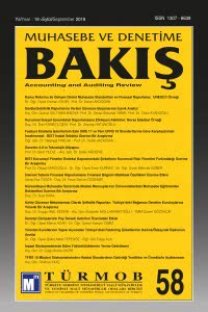MUHASEBE FİRMALARINDA PAZAR ODAKLILIK VE İLİŞKİSELPAZARLAMA
Muhasebe mesleği, profesyonel hizmetler, pazar odaklılık, ilişkisel pazarlama
___
- Agarwal, S., Erramilli, M. K. and Dev, Chekitan S. (2003), “Market Orientation and Performance in Service Firms: Role of Innovation, Journal of Services Marketing, Vol:17, No:1, s:.68-82
- Anderson, James C. ve Narus, James A. (1991), “Partnering as a Focused Market Strategy”, California Mana- gement Review, Spring, Vol: 33, No:3. pp.95-113.
- Avlontis, George J. ve Gounaris, Spiros P. (1999), “Marketing Orientation and Its Determinants: An Empirical Analysis”, European Journal of Marketing, Vol.33, No.11/12, s: 1003-1037.
- Barr, Terri Feldman ve McNeilly, Kevin M. (2003), “Marketing: Is It Still Just an Advertising? The Experiences of Accounting Firms as a Guide for Other Professional Service Firms”, Journal of Services Marketing, Vol:17, No:7, s: 713-729.
- Bayazıtlı, Ercan ve Koçak, Akın (2002), “Muhasebe Mesleğinde Pazarlama Üzerine Bir Araştırma”, Temel Eğitim ve Staj Merkezi Yayınları, Yayın No: 45, Ankara.
- Bloom, Paul N. (1984), “Effective marketing for professional services”, Harvard Business Review, Sep/Oct, Vol. 62, No: 5, s: 102-110.
- Chaston, I., Badger, B., Mangles, T. ve Sadler-Smith, E. (2003), “Relationship Marketing, Knowledge Manage- ment Systems and E-Commerce Operations in Small UK Accountancy Practices”, Journal of Marketing Ma- nagement, Vol:19, No: 1/2, s:109-129.
- Crittenden, Victoria L., Davis, Larry R., Simon, Daniel T. ve Trompeter, Gregory (2003), “Deregulation of Pro- fessional Accounting Services in the United Kingdom: Integrating Marketing and Accounting”, Journal of Stra- tegic Marketing, Vol. 11 No:1, s: 37-53.
- Crosby, Lawrence A., Evans, Kenneth R. ve Cowles, Deborah (1990), “Relationship Quality in Services Selling: an Interpersonal Influence Perspective”, Journal of Marketing, Vol : 54. No: 3, s: 68-81.
- Desphande, Rohit ve Farley, U. John (1998), “Measuring Market Orientation: Generalization and Synthesis”, Jo- urnal of Market Focused Management, Vol.2, No.3, s:.213-232.
- Eriksson, Kent ve Vaghult, Anna Lofmarck (2000), “Customer Retention, Purchasing Behavior and Relationship Substance in Professional Services”. Industrial Marketing Management, Vol:29, No: 4, s:363-372.
- Ferguson, Clifford J. (1996), “Selling” professional services: a practical approach- Part I”, Management Deci- sion, Vol 34 No: 3, s:49-54.
- Foster. George ve Swenson, Dan W. (1997), “Measuring the Success of Activity Based Cost Management and Its Determinants”, Journal of Management Accounting Research, Vol: 9, s: 109-140.
- Goebel, Daniel J., Marshall, Greg W ve Locander, William B. (1998), “Activity-Based Costing Accounting for a Market Orientation”, Industrial Marketing Management, Vol:27, No:6, s: 497-510.
- Guo, Chiquan (2002), “Market Orientation and Business Performance”, European Journal of Marketing, Vol.36, No.9/10, pp.1154-1163.
- Harte, H. G. ve Dale, B. G. (1995), “Improving Quality in Professional Service Organizations: A Review of the Key Issues”, Managing Service Quality, Vol: 5, No:3, s:34-44.
- Jaensson, Jan- Erik (2002), “Relationship Marketing and Market Orientation in an African Context”, Internatio- nal Academy of African Business and Development (IAABD) conference, Port Elisabeth, South Africa, Ap- ril.
- Kohli, Ajay K. and Jaworski, Bernard J. (1990), “Market Orientation: The Construct, Research Propositions, and Managerial Implications”, Journal of Marketing, Vol.54, No.2, pp.1-18.
- Kohli, Ajay K., Jaworski, Bernard J. and Kumar, Ajith (1993), “MARKOR: A Measure of Market Orientation”, Journal of Marketing Research, Vol.30, No.4, November, 467-477.
- Mills J. and Tsamenyi M. (2000), “Communicative Action and the Accounting/Marketing Interface in Industry”, Journal of Applied Management Studies, Vol: 9, No 2, s: 257-273.
- Morgan, Neil A., (1990),“Professional Accountancy Firms and Marketing”, Service Industries Journal, Vol: 10, No: 3, s: 599-613.
- Morgan, Robert E., Katsikeas, Constantine S. ve Appiah-Adu, Kwaku. (1998), “Market Orientation and Organi- sational Learning Capabilities”, Journal of Marketing Management, Vol: 14, No:4/5, s: 353-381.
- Murdock, G. ve McGrail, G. (1994) Developing a customer-oriented approach to fee setting. The National Pub- lic Accountant, Vol:39, No:9, s:17–23.
- Narver, John C. and Slater, Stanley F. (1990), “The Effect of a Market Orientation on Business Profitability”, Jo- urnal of Marketing, October, 5, pp.20-35.
- Nevin, J.R. (1994), “Relationship marketing and distribution channels: Exploring fundamental issues”, Journal of Academic Marketing Science, Vol: 23, No: 4, s:334-337.
- Nielsen, Jorn Flohr, Bukh, Per Nikolaj D. ve Mols, Niels Peter (2000), “ Barriers to Customer-Oriented Mana- gement Accounting in Financial Services”, International Journal of Service Industry Management, Vol. 11 No: 3, s: 269- 286.
- Rexha, Nexhmi, Kirk-Burnnand, Tamara ve Ramaseshan, B. (2000), “The Impact of Technically Focused Valu- es or Market Orientaiton of Professional Service Firms”, Journal of Professional Services Marketing, Vol.21, No.1, s:45-61.
- Roxas, Maria L., Peek, Lucia, Peek, George A. ve Hagemann, Thorsten (2000), “ Preliminary Evaluation of Pro- fessional Accounting Services: Direct Marketing on the Internet”. Journal of Services Marketing, Vol: 14, No: 6/7, s: 595- 606.
- Webster, Jr. (1988), “The Rediscovery of Marketing Concept”, Business Horizons, Vol:31, No:3, s:29-39.
- Yau, Oliver H. M. ve Wong, Thomas (1990), “How do CPA Firms Perceive Marketing and Advertising? A Hong Kong Experience”, European Journal of Marketing, Vol. 24, No: 2, s: 43-54.
- Yükselen, Cemal (2002), “Muhasebe ve Mali Müşavirlik Hizmetlerinde Pazarlama”, İSMMMO Yayınları, Yayın No:39, İstanbul.
- ISSN: 1307-6639
- Yayın Aralığı: 3
- Başlangıç: 2000
- Yayıncı: TÜRMOB
ÜRÜN BİLEŞİM, MALİYETVE FİYATININ BELİRLENMESİNDE DEĞER ANALİZİ YÖNTEMİ : BİLGİSAYAR ÖRNEĞİ
Selim BEKÇİOĞLU, Mustafa ÖZTÜRK, Betül AÇIKGÖZ
GENİŞ KAPSAMLI KÂR: FİNANSALTABLOLARDA RAPORLANMASI ve TÜRKİYE UYGULAMASI
KALİTE MALİYETLERİAÇISINDAN KÜÇÜK VE ORTA ÖLÇEKLİ İŞLETMELERİN DEĞERLENDİRİLMESİ: ERZURUM ÖRNEĞİ
